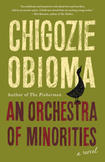Review: A tragic story of ambition and despair
A typical night portrayed in An Orchestra of Minorities, the second novel by Chigozie Obioma, is “filled with the din of spirits and the brass drum of the sublunary world, a multitude of voices emitting cries, shouts, voices, howls, noises.” The novel is narrated by a guardian spirit—a chi—imbuing the book with a grand voice and vision, consistent with the Igbo cosmology of a preordained world. Obioma’s novel captures the religious paradox of Nigeria, a paradox he has described as both the “fusion” and “clash” between Christian belief and Igbo cultural traditions.
Obioma’s central character is Chinonso, an Igbo poultry farmer who seems content with his life. Early in the novel, Chinonso notices a car parked on a bridge above the Amatu River, “one of its doors flung wide open.” He sees a woman, Ndali, about to jump into the river and yells for her to stop. Chinonso throws two chickens into the water to make a violent point: This is what will happen to you.
A few months later, Chinonso sees Ndali again at a fueling station, and they soon fall in love. Ndali is Catholic, and Chinonso’s chi speaks of the coexistence of Igbo and Catholic faiths: “In the doctrine of the new religion the children of the fathers have embraced, it is said that the two become one flesh. What truth,” the chi proclaims. This religious interplay permeates their relationship. “You are a shepherd of birds, and you love your flock,” Ndali says to Chinonso. “You care for them the way Jesus cares for his sheep with so much love.”
An Orchestra of Minorities is a profoundly tragic story of ambition and despair and how both come from the struggle to love.
Ndali is nervous about Chinonso meeting her family, but religious difference is not the main concern. Ndali’s family is wealthy; she warns Chinonso that her family may not accept him. They don’t. Humiliated, Chinonso decides that he must do something drastic to gain the respect of Ndali’s family. He sells his farm and, through an acquaintance, applies to study at Cyprus International University. Ndali realizes he has been defrauded by his acquaintance, and there is no acceptance or scholarship.
By narrating Chinonso’s struggles through his chi—a being with transcendent knowledge but one who must not interfere in the life of his host—Obioma creates dramatic tension. Distraught and alone in Cyprus, Chinonso desires revenge, a theme that powers the second half of the novel. An Orchestra of Minorities is a profoundly tragic story of ambition and despair and how both come from the struggle to love.
This article also appeared in print, under the headline “Fusion and clash,” in the August 5, 2019, issue.








